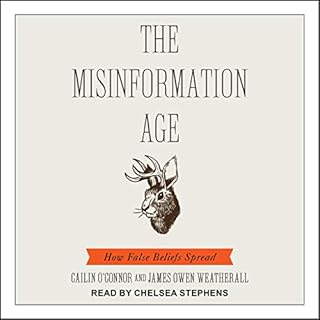
The Case Against Perfection
No se pudo agregar al carrito
Add to Cart failed.
Error al Agregar a Lista de Deseos.
Error al eliminar de la lista de deseos.
Error al añadir a tu biblioteca
Error al seguir el podcast
Error al dejar de seguir el podcast
 Exclusivo para miembros Prime: ¿Nuevo en Audible? Obtén 2 audiolibros gratis con tu prueba.
Exclusivo para miembros Prime: ¿Nuevo en Audible? Obtén 2 audiolibros gratis con tu prueba.Compra ahora por $24.35
No default payment method selected.
We are sorry. We are not allowed to sell this product with the selected payment method
-
Narrado por:
-
Pete Cross
Acerca de esta escucha
Breakthroughs in genetics present us with a promise and a predicament. The promise is that we will soon be able to treat and prevent a host of debilitating diseases. The predicament is that our newfound genetic knowledge may enable us to manipulate our nature - to enhance our genetic traits and those of our children. Although most people find at least some forms of genetic engineering disquieting, it is not easy to articulate why.
The Case Against Perfection explores these and other moral quandaries connected with the quest to perfect ourselves and our children. Michael Sandel argues that the pursuit of perfection is flawed for reasons that go beyond safety and fairness. The drive to enhance human nature through genetic technologies is objectionable because it represents a bid for mastery and dominion that fails to appreciate the gifted character of human powers and achievements. Carrying us beyond familiar terms of political discourse, this book contends that the genetic revolution will change the way philosophers discuss ethics and will force spiritual questions back onto the political agenda.
In order to grapple with the ethics of enhancement, we need to confront questions largely lost from view in the modern world. Since these questions verge on theology, modern philosophers and political theorists tend to shrink from them. But our new powers of biotechnology make these questions unavoidable.
©2019 Dreamscape Media, LLC (P)2019 Dreamscape Media, LLCLos oyentes también disfrutaron...
-
What Money Can't Buy
- The Moral Limits of Markets
- De: Michael J. Sandel
- Narrado por: Michael J. Sandel
- Duración: 7 h y 28 m
- Versión completa
-
General4.5 out of 5 stars 530
-
Narración:4.5 out of 5 stars 451
-
Historia4.5 out of 5 stars 445
Should we pay children to read books or to get good grades? Should we allow corporations to pay for the right to pollute the atmosphere? Is it ethical to pay people to test risky new drugs or to donate their organs? What about hiring mercenaries to fight our wars? Auctioning admission to elite universities? Selling citizenship to immigrants willing to pay?
-
5 out of 5 stars
-
Challenging
- De Kendra en 02-25-13
-
Determined
- A Science of Life Without Free Will
- De: Robert M. Sapolsky
- Narrado por: Kaleo Griffith
- Duración: 13 h y 42 m
- Versión completa
-
General4.5 out of 5 stars 792
-
Narración:4.5 out of 5 stars 713
-
Historia4.5 out of 5 stars 713
Robert Sapolsky’s Behave, his now classic account of why humans do good and why they do bad, pointed toward an unsettling conclusion: We may not grasp the precise marriage of nature and nurture that creates the physics and chemistry at the base of human behavior, but that doesn’t mean it doesn’t exist. Now, in Determined, Sapolsky takes his argument all the way, mounting a brilliant (and in his inimitable way, delightful) full-frontal assault on the pleasant fantasy that there is some separate self telling our biology what to do.
-
4 out of 5 stars
-
Abridged - no Appendix!
- De Amazon Customer en 11-02-23
-
The Tyranny of Merit
- What's Become of the Common Good?
- De: Michael J. Sandel
- Narrado por: Michael J. Sandel
- Duración: 11 h y 17 m
- Versión completa
-
General4.5 out of 5 stars 926
-
Narración:4.5 out of 5 stars 768
-
Historia4.5 out of 5 stars 761
The world-renowned philosopher and author of the best-selling Justice explores the central question of our time: What has become of the common good? World-renowned philosopher Michael J. Sandel argues that to overcome the crises that are upending our world, we must rethink the attitudes toward success and failure that have accompanied globalization and rising inequality. Sandel shows the hubris a meritocracy generates among the winners and the harsh judgment it imposes on those left behind, and traces the dire consequences across a wide swath of American life.
-
5 out of 5 stars
-
Enlightening
- De Robert McIntosh en 09-18-20
-
Justice
- De: Michael J. Sandel
- Narrado por: Michael J. Sandel
- Duración: 11 h y 1 m
- Versión completa
-
General4.5 out of 5 stars 1,348
-
Narración:4.5 out of 5 stars 999
-
Historia4.5 out of 5 stars 990
What are our obligations to others as people in a free society? Should government tax the rich to help the poor? Is the free market fair? Is it sometimes wrong to tell the truth? Do individual rights and the common good conflict? These questions are at the core of our public life today - and at the heart of Justice, in which Michael J. Sandel shows how a surer grasp of philosophy can help us to make sense of politics, morality, and our own convictions as well.
-
5 out of 5 stars
-
A very worthwhile book
- De Amazon Customer en 11-11-09
-
Upstream
- The Quest to Solve Problems Before They Happen
- De: Dan Heath
- Narrado por: Dan Heath
- Duración: 7 h y 47 m
- Versión completa
-
General4.5 out of 5 stars 1,528
-
Narración:5 out of 5 stars 1,283
-
Historia4.5 out of 5 stars 1,275
New York Times best-selling author Dan Heath examines how to prevent problems before they happen, drawing on insights from his innovative behavior research, as well as hundreds of new interviews with unconventional problem solvers. Most of us spend our days handling a deluge of pressing issues. We’re so accustomed to managing emergencies as they strike that we often don’t stop to think about how we could prevent crises before they happen. Why stop at treating the symptoms when you could develop a cure?
-
3 out of 5 stars
-
Mixed review
- De Aaron en 12-09-20
De: Dan Heath
-
The Identity Trap
- A Story of Ideas and Power in Our Time
- De: Yascha Mounk
- Narrado por: JD Jackson
- Duración: 11 h y 1 m
- Versión completa
-
General4.5 out of 5 stars 188
-
Narración:4.5 out of 5 stars 162
-
Historia4.5 out of 5 stars 162
For much of history, societies have violently oppressed ethnic, religious, and sexual minorities. It is no surprise that many who passionately believe in social justice came to believe that members of marginalized groups need to take pride in their identity to resist injustice.
-
5 out of 5 stars
-
May It Mark A Turning Point
- De Larry en 09-28-23
De: Yascha Mounk
-
What Money Can't Buy
- The Moral Limits of Markets
- De: Michael J. Sandel
- Narrado por: Michael J. Sandel
- Duración: 7 h y 28 m
- Versión completa
-
General4.5 out of 5 stars 530
-
Narración:4.5 out of 5 stars 451
-
Historia4.5 out of 5 stars 445
Should we pay children to read books or to get good grades? Should we allow corporations to pay for the right to pollute the atmosphere? Is it ethical to pay people to test risky new drugs or to donate their organs? What about hiring mercenaries to fight our wars? Auctioning admission to elite universities? Selling citizenship to immigrants willing to pay?
-
5 out of 5 stars
-
Challenging
- De Kendra en 02-25-13
-
Determined
- A Science of Life Without Free Will
- De: Robert M. Sapolsky
- Narrado por: Kaleo Griffith
- Duración: 13 h y 42 m
- Versión completa
-
General4.5 out of 5 stars 792
-
Narración:4.5 out of 5 stars 713
-
Historia4.5 out of 5 stars 713
Robert Sapolsky’s Behave, his now classic account of why humans do good and why they do bad, pointed toward an unsettling conclusion: We may not grasp the precise marriage of nature and nurture that creates the physics and chemistry at the base of human behavior, but that doesn’t mean it doesn’t exist. Now, in Determined, Sapolsky takes his argument all the way, mounting a brilliant (and in his inimitable way, delightful) full-frontal assault on the pleasant fantasy that there is some separate self telling our biology what to do.
-
4 out of 5 stars
-
Abridged - no Appendix!
- De Amazon Customer en 11-02-23
-
The Tyranny of Merit
- What's Become of the Common Good?
- De: Michael J. Sandel
- Narrado por: Michael J. Sandel
- Duración: 11 h y 17 m
- Versión completa
-
General4.5 out of 5 stars 926
-
Narración:4.5 out of 5 stars 768
-
Historia4.5 out of 5 stars 761
The world-renowned philosopher and author of the best-selling Justice explores the central question of our time: What has become of the common good? World-renowned philosopher Michael J. Sandel argues that to overcome the crises that are upending our world, we must rethink the attitudes toward success and failure that have accompanied globalization and rising inequality. Sandel shows the hubris a meritocracy generates among the winners and the harsh judgment it imposes on those left behind, and traces the dire consequences across a wide swath of American life.
-
5 out of 5 stars
-
Enlightening
- De Robert McIntosh en 09-18-20
-
Justice
- De: Michael J. Sandel
- Narrado por: Michael J. Sandel
- Duración: 11 h y 1 m
- Versión completa
-
General4.5 out of 5 stars 1,348
-
Narración:4.5 out of 5 stars 999
-
Historia4.5 out of 5 stars 990
What are our obligations to others as people in a free society? Should government tax the rich to help the poor? Is the free market fair? Is it sometimes wrong to tell the truth? Do individual rights and the common good conflict? These questions are at the core of our public life today - and at the heart of Justice, in which Michael J. Sandel shows how a surer grasp of philosophy can help us to make sense of politics, morality, and our own convictions as well.
-
5 out of 5 stars
-
A very worthwhile book
- De Amazon Customer en 11-11-09
-
Upstream
- The Quest to Solve Problems Before They Happen
- De: Dan Heath
- Narrado por: Dan Heath
- Duración: 7 h y 47 m
- Versión completa
-
General4.5 out of 5 stars 1,528
-
Narración:5 out of 5 stars 1,283
-
Historia4.5 out of 5 stars 1,275
New York Times best-selling author Dan Heath examines how to prevent problems before they happen, drawing on insights from his innovative behavior research, as well as hundreds of new interviews with unconventional problem solvers. Most of us spend our days handling a deluge of pressing issues. We’re so accustomed to managing emergencies as they strike that we often don’t stop to think about how we could prevent crises before they happen. Why stop at treating the symptoms when you could develop a cure?
-
3 out of 5 stars
-
Mixed review
- De Aaron en 12-09-20
De: Dan Heath
-
The Identity Trap
- A Story of Ideas and Power in Our Time
- De: Yascha Mounk
- Narrado por: JD Jackson
- Duración: 11 h y 1 m
- Versión completa
-
General4.5 out of 5 stars 188
-
Narración:4.5 out of 5 stars 162
-
Historia4.5 out of 5 stars 162
For much of history, societies have violently oppressed ethnic, religious, and sexual minorities. It is no surprise that many who passionately believe in social justice came to believe that members of marginalized groups need to take pride in their identity to resist injustice.
-
5 out of 5 stars
-
May It Mark A Turning Point
- De Larry en 09-28-23
De: Yascha Mounk
-
The Communist Manifesto
- De: Karl Marx
- Narrado por: Greg Wagland
- Duración: 1 h y 34 m
- Versión completa
-
General4 out of 5 stars 1,274
-
Narración:4.5 out of 5 stars 1,089
-
Historia4 out of 5 stars 1,076
‘It was a sweet finish after the bitter pills of floggings and bullets with which these same governments, just at that time, dosed the German working-class risings’. The Communist Manifesto is, perhaps surprisingly, a most engaging and accessible work, containing even the odd shaft of humour in this translation by Samuel Moore for the 1888 English edition.
-
5 out of 5 stars
-
Forcibly over throw anyone who owns land?
- De Austin Hair en 02-13-20
De: Karl Marx
-
Tyranny of the Minority
- Why American Democracy Reached the Breaking Point
- De: Steven Levitsky, Daniel Ziblatt
- Narrado por: Fred Sanders
- Duración: 8 h y 49 m
- Versión completa
-
General4.5 out of 5 stars 299
-
Narración:4.5 out of 5 stars 267
-
Historia4.5 out of 5 stars 267
America is undergoing a massive experiment: It is moving, in fits and starts, toward a multiracial democracy, something few societies have ever done. But the prospect of change has sparked an authoritarian backlash that threatens the very foundations of our political system. Why is democracy under assault here, and not in other wealthy, diversifying nations? And what can we do to save it?
-
5 out of 5 stars
-
Tyranny of the Minority
- De orders en 10-07-23
De: Steven Levitsky, y otros
-
Trans
- When Ideology Meets Reality
- De: Helen Joyce
- Narrado por: Helen Joyce
- Duración: 10 h y 32 m
- Versión completa
-
General5 out of 5 stars 462
-
Narración:4.5 out of 5 stars 406
-
Historia5 out of 5 stars 402
Gender identity ideology is about more than Twitter storms and using the right pronouns. In just 10 years, laws, company policies, school and university curricula, sport, medical protocols, and the media have been reshaped to privilege self-declared gender identity over biological sex. People are being shamed and silenced for attempting to understand the consequences of redefining "man" and "woman". While compassion for transgender lives is well-intentioned, it is stifling much-needed inquiry into the significance of our bodies.
-
5 out of 5 stars
-
rational, clear criticism of trans ideology
- De M. Horne en 02-08-22
De: Helen Joyce
-
The Man from the Future
- The Visionary Life of John von Neumann
- De: Ananyo Bhattacharya
- Narrado por: Nicholas Camm
- Duración: 11 h y 56 m
- Versión completa
-
General4.5 out of 5 stars 334
-
Narración:4.5 out of 5 stars 287
-
Historia4.5 out of 5 stars 286
The smartphones in our pockets and computers like brains. The vagaries of game theory and evolutionary biology. Nuclear weapons and self-replicating spacecrafts. All bear the fingerprints of one remarkable, yet largely overlooked, man: John von Neumann.
-
4 out of 5 stars
-
Good book, very odd narration
- De Ben Wiener en 04-10-22
-
Noise
- A Flaw in Human Judgment
- De: Daniel Kahneman, Olivier Sibony, Cass R. Sunstein
- Narrado por: Jonathan Todd Ross
- Duración: 13 h y 28 m
- Versión completa
-
General4.5 out of 5 stars 1,421
-
Narración:4.5 out of 5 stars 1,156
-
Historia4.5 out of 5 stars 1,145
From the best-selling author of Thinking, Fast and Slow, the co-author of Nudge, and the author of You Are About to Make a Terrible Mistake! comes Noise, a revolutionary exploration of why people make bad judgments, and how to control both noise and cognitive bias.
-
1 out of 5 stars
-
Disappointing
- De Z28 en 05-31-21
De: Daniel Kahneman, y otros
-
Discourse on Metaphysics, On the Ultimate Origin of Things and Other Principal Essays
- De: Gottfried Wilhelm Leibniz
- Narrado por: Charles Armstrong
- Duración: 5 h y 14 m
- Versión completa
-
General4.5 out of 5 stars 44
-
Narración:5 out of 5 stars 40
-
Historia4.5 out of 5 stars 40
This Leibniz collection contains some of the philosopher’s most important works and ideas, spans three decades and illuminates the fascinating intellectual journey undertaken by him in his quest for truth. A prodigious polymath, Leibniz was a mathematician, philosopher, physicist and statesman and engaged with a sweeping range of ideas and disciplines, striving throughout his life to be at the cutting edge of scientific thinking. These Principal Essays are arranged in chronological order.
-
5 out of 5 stars
-
Philosophy at it’s best
- De Roman Greenberg en 02-03-22
-
Sapiens
- De: Yuval Noah Harari
- Narrado por: Derek Perkins
- Duración: 15 h y 18 m
- Versión completa
-
General5 out of 5 stars 3,852
-
Narración:5 out of 5 stars 3,303
-
Historia5 out of 5 stars 3,290
Earth is 4.5 billion years old. In just a fraction of that time, one species among countless others has conquered it. Us. We are the most advanced and most destructive animals ever to have lived. What makes us brilliant? What makes us deadly? What makes us sapiens? In this bold and provocative audiobook, Yuval Noah Harari explores who we are, how we got here, and where we're going.
-
5 out of 5 stars
-
Life changing book
- De Bradley Janse van Rensburg en 06-13-17
-
The Genetic Lottery
- Why DNA Matters for Social Equality
- De: Kathryn Paige Harden
- Narrado por: Katherine Fenton
- Duración: 10 h y 4 m
- Versión completa
-
General4.5 out of 5 stars 211
-
Narración:4.5 out of 5 stars 166
-
Historia4.5 out of 5 stars 164
In The Genetic Lottery, Harden introduces listeners to the latest genetic science, dismantling dangerous ideas about racial superiority and challenging us to grapple with what equality really means in a world where people are born different. Weaving together personal stories with scientific evidence, Harden shows why our refusal to recognize the power of DNA perpetuates the myth of meritocracy, and argues that we must acknowledge the role of genetic luck if we are ever to create a fair society.
-
3 out of 5 stars
-
Mix of Genetic Science and Ideology
- De James en 10-12-21
-
I Hate the Ivy League
- Riffs and Rants on Elite Education
- De: Malcolm Gladwell
- Narrado por: Malcolm Gladwell
- Duración: 5 h y 11 m
- Versión completa
-
General5 out of 5 stars 1,546
-
Narración:5 out of 5 stars 1,377
-
Historia4.5 out of 5 stars 1,366
Malcolm Gladwell has long relished the opportunity to skewer the upper echelons of higher education, from the institution of U.S. News & World Report’s Best College rankings to the LSATs to the luxe Bowdoin College cafeteria. I Hate the Ivy League: Riffs and Rants on Elite Education, upends the traditional thinking around how education should work and tries to get to the bottom of why we often reward the wrong people.
-
3 out of 5 stars
-
Great content but don’t bother purchasing if you have heard the podcasts
- De katieKo en 10-23-22
De: Malcolm Gladwell
-
The Reith Lectures
- 10 of the Best
- De: various
- Narrado por: Grayson Perry, Hilary Mantel, Tom Kirkwood, y otros
- Duración: 7 h y 30 m
- Grabación Original
-
General5 out of 5 stars 3
-
Narración:5 out of 5 stars 3
-
Historia5 out of 5 stars 3
Since 1948, the BBC's iconic annual lecture series has provided a platform for brilliant, entertaining individuals to discuss and develop their ideas on radio. The topics range from art and science to history, culture, politics and more, and each Reith Lecture - which is a little longer than a TED talk - is followed by a lively question-and-answer session showcasing the speaker's expertise, wisdom and wit. This collection brings together 10 of the very best Reith Lectures, chosen by the series producer, Jim Frank.
De: various
-
Predictably Irrational
- The Hidden Forces That Shape Our Decisions
- De: Dan Ariely
- Narrado por: Simon Jones
- Duración: 7 h y 22 m
- Versión completa
-
General4.5 out of 5 stars 12,578
-
Narración:4.5 out of 5 stars 8,858
-
Historia4.5 out of 5 stars 8,829
In a series of illuminating, often surprising experiments, MIT behavioral economist Dan Ariely refutes the common assumption that we behave in fundamentally rational ways. Blending everyday experience with groundbreaking research, Ariely explains how expectations, emotions, social norms, and other invisible, seemingly illogical forces skew our reasoning abilities.
-
3 out of 5 stars
-
Good lessons, mediocre science?
- De William Stanger en 02-24-09
De: Dan Ariely
-
Capital in the Twenty-First Century
- De: Thomas Piketty, Arthur Goldhammer - translator
- Narrado por: L. J. Ganser
- Duración: 24 h y 58 m
- Versión completa
-
General4.5 out of 5 stars 3,558
-
Narración:4.5 out of 5 stars 2,983
-
Historia4.5 out of 5 stars 2,961
What are the grand dynamics that drive the accumulation and distribution of capital? Questions about the long-term evolution of inequality, the concentration of wealth, and the prospects for economic growth lie at the heart of political economy. But satisfactory answers have been hard to find for lack of adequate data and clear guiding theories.
-
5 out of 5 stars
-
The Financial Times' Critique Doesn't Detract
- De Madeleine en 05-22-14
De: Thomas Piketty, y otros
Relacionado con este tema
-
My Big TOE: Awakening
- Book One of a Trilogy Unifying Philosophy, Physics, and Metaphysics
- De: Thomas Campbell
- Narrado por: Thomas Campbell
- Duración: 11 h y 11 m
- Versión completa
-
General4.5 out of 5 stars 506
-
Narración:4.5 out of 5 stars 437
-
Historia4.5 out of 5 stars 432
My Big TOE: Awakening, written by a nuclear physicist in the language of contemporary culture, unifies science and philosophy, physics and metaphysics, mind and matter, purpose and meaning, the normal and the paranormal. The entirety of human experience (mind, body, and spirit) including both our objective and subjective worlds is brought together under one seamless scientific understanding.
-
2 out of 5 stars
-
What a Trip (but to where?)
- De Michael en 11-26-13
De: Thomas Campbell
-
Brain Energy
- A Revolutionary Breakthrough in Understanding Mental Health—and Improving Treatment for Anxiety, Depression, OCD, PTSD, and More
- De: Christopher M. Palmer MD
- Narrado por: Christopher M. Palmer MD
- Duración: 12 h y 18 m
- Versión completa
-
General4.5 out of 5 stars 1,169
-
Narración:4.5 out of 5 stars 1,022
-
Historia4.5 out of 5 stars 1,018
We are in the midst of a global mental health crisis, and mental illnesses are on the rise. But what causes mental illness? And why are mental health problems so hard to treat? Drawing on decades of research, Harvard psychiatrist Dr. Chris Palmer outlines a revolutionary new understanding that for the first time unites our existing knowledge about mental illness within a single framework: mental disorders are metabolic disorders of the brain. Brain Energy will transform the field of mental health, and the lives of countless people around the world.
-
1 out of 5 stars
-
Arguing brain health theory to medical profession
- De Maya H Saric en 03-10-23
-
Welcome to the Universe
- An Astrophysical Tour
- De: Michael A. Strauss, J. Richard Gott, Neil deGrasse Tyson
- Narrado por: Michael Butler Murray
- Duración: 17 h y 53 m
- Versión completa
-
General4.5 out of 5 stars 1,377
-
Narración:4.5 out of 5 stars 1,214
-
Historia4.5 out of 5 stars 1,209
Welcome to the Universe is a personal guided tour of the cosmos by three of today's leading astrophysicists. Inspired by the enormously popular introductory astronomy course that Neil deGrasse Tyson, Michael A. Strauss, and J. Richard Gott taught together at Princeton, this book covers it all - from planets, stars, and galaxies to black holes, wormholes, and time travel.
-
3 out of 5 stars
-
All About What We Know About the Universe - ALL
- De J.B. en 02-17-17
De: Michael A. Strauss, y otros
-
The Selfish Gene
- De: Richard Dawkins
- Narrado por: Richard Dawkins, Lalla Ward
- Duración: 16 h y 12 m
- Versión completa
-
General4.5 out of 5 stars 8,933
-
Narración:4.5 out of 5 stars 7,547
-
Historia4.5 out of 5 stars 7,469
Richard Dawkins' brilliant reformulation of the theory of natural selection has the rare distinction of having provoked as much excitement and interest outside the scientific community as within it. His theories have helped change the whole nature of the study of social biology, and have forced thousands to rethink their beliefs about life.
-
5 out of 5 stars
-
Better than print!
- De J. D. May en 07-31-12
De: Richard Dawkins
-
How the Earth Works
- De: Michael E. Wysession, The Great Courses
- Narrado por: Michael E. Wysession
- Duración: 24 h y 31 m
- Grabación Original
-
General4.5 out of 5 stars 1,728
-
Narración:4.5 out of 5 stars 1,508
-
Historia4.5 out of 5 stars 1,490
How the Earth Works takes you on an astonishing journey through time and space. In 48 lectures, you will look at what went into making our planet - from the big bang, to the formation of the solar system, to the subsequent evolution of Earth.
-
5 out of 5 stars
-
Excellent course
- De Doug B. en 05-23-19
De: Michael E. Wysession, y otros
-
Secrets of the Octopus
- De: Sy Montgomery, Warren K. Carlyle IV - contributor, Alex Schnell - foreword
- Narrado por: Sy Montgomery
- Duración: 4 h y 30 m
- Versión completa
-
General4 out of 5 stars 3
-
Narración:3.5 out of 5 stars 3
-
Historia3.5 out of 5 stars 3
Remarkable new discoveries affirm the octopus as one of nature’s most intelligent and complex animals. This new book brings us closer than ever to these elusive creatures. The companion to the highly anticipated National Geographic television special, this book explores the alluring underwater world of the octopus—a creature that resembles an alien lifeform, but whose behavior has earned it a reputation as one of the most intelligent animals on the planet.
-
4 out of 5 stars
-
An okay listen
- De Tae Bailon en 01-24-25
De: Sy Montgomery, y otros
-
My Big TOE: Awakening
- Book One of a Trilogy Unifying Philosophy, Physics, and Metaphysics
- De: Thomas Campbell
- Narrado por: Thomas Campbell
- Duración: 11 h y 11 m
- Versión completa
-
General4.5 out of 5 stars 506
-
Narración:4.5 out of 5 stars 437
-
Historia4.5 out of 5 stars 432
My Big TOE: Awakening, written by a nuclear physicist in the language of contemporary culture, unifies science and philosophy, physics and metaphysics, mind and matter, purpose and meaning, the normal and the paranormal. The entirety of human experience (mind, body, and spirit) including both our objective and subjective worlds is brought together under one seamless scientific understanding.
-
2 out of 5 stars
-
What a Trip (but to where?)
- De Michael en 11-26-13
De: Thomas Campbell
-
Brain Energy
- A Revolutionary Breakthrough in Understanding Mental Health—and Improving Treatment for Anxiety, Depression, OCD, PTSD, and More
- De: Christopher M. Palmer MD
- Narrado por: Christopher M. Palmer MD
- Duración: 12 h y 18 m
- Versión completa
-
General4.5 out of 5 stars 1,169
-
Narración:4.5 out of 5 stars 1,022
-
Historia4.5 out of 5 stars 1,018
We are in the midst of a global mental health crisis, and mental illnesses are on the rise. But what causes mental illness? And why are mental health problems so hard to treat? Drawing on decades of research, Harvard psychiatrist Dr. Chris Palmer outlines a revolutionary new understanding that for the first time unites our existing knowledge about mental illness within a single framework: mental disorders are metabolic disorders of the brain. Brain Energy will transform the field of mental health, and the lives of countless people around the world.
-
1 out of 5 stars
-
Arguing brain health theory to medical profession
- De Maya H Saric en 03-10-23
-
Welcome to the Universe
- An Astrophysical Tour
- De: Michael A. Strauss, J. Richard Gott, Neil deGrasse Tyson
- Narrado por: Michael Butler Murray
- Duración: 17 h y 53 m
- Versión completa
-
General4.5 out of 5 stars 1,377
-
Narración:4.5 out of 5 stars 1,214
-
Historia4.5 out of 5 stars 1,209
Welcome to the Universe is a personal guided tour of the cosmos by three of today's leading astrophysicists. Inspired by the enormously popular introductory astronomy course that Neil deGrasse Tyson, Michael A. Strauss, and J. Richard Gott taught together at Princeton, this book covers it all - from planets, stars, and galaxies to black holes, wormholes, and time travel.
-
3 out of 5 stars
-
All About What We Know About the Universe - ALL
- De J.B. en 02-17-17
De: Michael A. Strauss, y otros
-
The Selfish Gene
- De: Richard Dawkins
- Narrado por: Richard Dawkins, Lalla Ward
- Duración: 16 h y 12 m
- Versión completa
-
General4.5 out of 5 stars 8,933
-
Narración:4.5 out of 5 stars 7,547
-
Historia4.5 out of 5 stars 7,469
Richard Dawkins' brilliant reformulation of the theory of natural selection has the rare distinction of having provoked as much excitement and interest outside the scientific community as within it. His theories have helped change the whole nature of the study of social biology, and have forced thousands to rethink their beliefs about life.
-
5 out of 5 stars
-
Better than print!
- De J. D. May en 07-31-12
De: Richard Dawkins
-
How the Earth Works
- De: Michael E. Wysession, The Great Courses
- Narrado por: Michael E. Wysession
- Duración: 24 h y 31 m
- Grabación Original
-
General4.5 out of 5 stars 1,728
-
Narración:4.5 out of 5 stars 1,508
-
Historia4.5 out of 5 stars 1,490
How the Earth Works takes you on an astonishing journey through time and space. In 48 lectures, you will look at what went into making our planet - from the big bang, to the formation of the solar system, to the subsequent evolution of Earth.
-
5 out of 5 stars
-
Excellent course
- De Doug B. en 05-23-19
De: Michael E. Wysession, y otros
-
Secrets of the Octopus
- De: Sy Montgomery, Warren K. Carlyle IV - contributor, Alex Schnell - foreword
- Narrado por: Sy Montgomery
- Duración: 4 h y 30 m
- Versión completa
-
General4 out of 5 stars 3
-
Narración:3.5 out of 5 stars 3
-
Historia3.5 out of 5 stars 3
Remarkable new discoveries affirm the octopus as one of nature’s most intelligent and complex animals. This new book brings us closer than ever to these elusive creatures. The companion to the highly anticipated National Geographic television special, this book explores the alluring underwater world of the octopus—a creature that resembles an alien lifeform, but whose behavior has earned it a reputation as one of the most intelligent animals on the planet.
-
4 out of 5 stars
-
An okay listen
- De Tae Bailon en 01-24-25
De: Sy Montgomery, y otros
-
My Big TOE: Discovery
- Book Two of a Trilogy Unifying Philosophy, Physics, and Metaphysics
- De: Thomas Campbell
- Narrado por: Thomas Campbell
- Duración: 15 h y 25 m
- Versión completa
-
General4.5 out of 5 stars 258
-
Narración:4.5 out of 5 stars 227
-
Historia4.5 out of 5 stars 221
Section 3 develops the interface and interaction between we the people and our digital consciousness reality. It derives and explains the characteristics, origins, dynamics, and function of ego, love, and free will. It derives our larger purpose. Finally, Section 3 develops the psi uncertainty principle as it explains and interrelates psi phenomena, free will, love, consciousness evolution, reality, human purpose, entropy and physics.
-
5 out of 5 stars
-
A guidebook to a bigger reality & realization
- De Diana en 11-27-13
De: Thomas Campbell
-
Letters from an Astrophysicist
- De: Neil deGrasse Tyson
- Narrado por: Neil deGrasse Tyson, Vikas Adam, Piper Goodeve, y otros
- Duración: 5 h y 35 m
- Versión completa
-
General4.5 out of 5 stars 2,139
-
Narración:5 out of 5 stars 1,847
-
Historia4.5 out of 5 stars 1,829
Astrophysicist Neil deGrasse Tyson has attracted one of the world’s largest online followings with his fascinating, widely accessible insights into science and our universe. Now, Tyson invites us to go behind the scenes of his public fame by unveiling his candid correspondence with people across the globe who have sought him out in search of answers. In this hand-picked collection of 100 letters, Tyson draws upon cosmic perspectives to address a vast array of questions about science, faith, philosophy, life, and of course, Pluto.
-
4 out of 5 stars
-
Dear Neil...
- De Tina G. en 10-14-19
-
The Last Season
- De: Eric Blehm
- Narrado por: Jonathan Davis
- Duración: 12 h y 34 m
- Versión completa
-
General4.5 out of 5 stars 3,219
-
Narración:4.5 out of 5 stars 2,877
-
Historia4.5 out of 5 stars 2,878
Destined to become a classic of adventure literature, The Last Season examines the extraordinary life of legendary backcountry ranger Randy Morgenson and his mysterious disappearance in California's unforgiving Sierra Nevada - mountains as perilous as they are beautiful. Eric Blehm's masterful work is a gripping detective story interwoven with the riveting biography of a complicated, original, and wholly fascinating man.
-
4 out of 5 stars
-
Well Written Character Study of an NPS Ranger
- De Kathy in CA en 06-23-16
De: Eric Blehm
-
Chemistry and Our Universe
- How It All Works
- De: Ron B. Davis, The Great Courses
- Narrado por: Ron B. Davis
- Duración: 30 h y 6 m
- Grabación Original
-
General4.5 out of 5 stars 520
-
Narración:4.5 out of 5 stars 412
-
Historia4.5 out of 5 stars 408
Chemistry and Our Universe: How It All Works is your in-depth introduction to this vital field, taught through 60 engaging half-hour lectures that are suitable for any background or none at all. Covering a year’s worth of introductory general chemistry at the college level, plus intriguing topics that are rarely discussed in the classroom, this amazingly comprehensive course requires nothing more advanced than high-school math. Your guide is Professor Ron B. Davis, Jr., a research chemist and award-winning teacher at Georgetown University.
-
4 out of 5 stars
-
Great Professor, Hard to Follow.
- De Jen en 05-14-19
De: Ron B. Davis, y otros
-
Ten Drugs
- How Plants, Powders, and Pills Have Shaped the History of Medicine
- De: Thomas Hager
- Narrado por: Angelo Di Loreto
- Duración: 8 h y 39 m
- Versión completa
-
General4.5 out of 5 stars 4,907
-
Narración:4.5 out of 5 stars 4,244
-
Historia4.5 out of 5 stars 4,226
Beginning with opium, the “joy plant,” which has been used for 10,000 years, Thomas Hager tells a captivating story of medicine. His subjects include the largely forgotten female pioneer who introduced smallpox inoculation to Britain, the infamous knockout drops, the first antibiotic, which saved countless lives, the first antipsychotic, which helped empty public mental hospitals, Viagra, statins, and the new frontier of monoclonal antibodies. This is a deep, wide-ranging, and wildly entertaining book.
-
4 out of 5 stars
-
Engrossing to physicians & lay persons alike
- De C. White en 03-08-19
De: Thomas Hager
-
Inspired
- How to Create Tech Products Customers Love, Second Edition
- De: Marty Cagan
- Narrado por: Marty Cagan
- Duración: 7 h y 45 m
- Versión completa
-
General4.5 out of 5 stars 2,690
-
Narración:4.5 out of 5 stars 2,191
-
Historia4.5 out of 5 stars 2,165
How do today's most successful tech companies - Amazon, Google, Facebook, Netflix, Tesla - design, develop, and deploy the products that have earned the love of literally billions of people around the world? Perhaps surprisingly, they do it very differently from the vast majority of tech companies. In Inspired, technology product management thought leader Marty Cagan provides listeners with a master class in how to structure and staff a vibrant and successful product organization and how to discover and deliver technology products that your customers will love.
-
4 out of 5 stars
-
Great book, terrible audio wanted to ask a refund
- De Srikanth Ramanujam en 11-15-18
De: Marty Cagan
Las personas que vieron esto también vieron...
-
What Money Can't Buy
- The Moral Limits of Markets
- De: Michael J. Sandel
- Narrado por: Michael J. Sandel
- Duración: 7 h y 28 m
- Versión completa
-
General4.5 out of 5 stars 530
-
Narración:4.5 out of 5 stars 451
-
Historia4.5 out of 5 stars 445
Should we pay children to read books or to get good grades? Should we allow corporations to pay for the right to pollute the atmosphere? Is it ethical to pay people to test risky new drugs or to donate their organs? What about hiring mercenaries to fight our wars? Auctioning admission to elite universities? Selling citizenship to immigrants willing to pay?
-
5 out of 5 stars
-
Challenging
- De Kendra en 02-25-13
-
Justice
- De: Michael J. Sandel
- Narrado por: Michael J. Sandel
- Duración: 11 h y 1 m
- Versión completa
-
General4.5 out of 5 stars 1,348
-
Narración:4.5 out of 5 stars 999
-
Historia4.5 out of 5 stars 990
What are our obligations to others as people in a free society? Should government tax the rich to help the poor? Is the free market fair? Is it sometimes wrong to tell the truth? Do individual rights and the common good conflict? These questions are at the core of our public life today - and at the heart of Justice, in which Michael J. Sandel shows how a surer grasp of philosophy can help us to make sense of politics, morality, and our own convictions as well.
-
5 out of 5 stars
-
A very worthwhile book
- De Amazon Customer en 11-11-09
-
The Tyranny of Merit
- What's Become of the Common Good?
- De: Michael J. Sandel
- Narrado por: Michael J. Sandel
- Duración: 11 h y 17 m
- Versión completa
-
General4.5 out of 5 stars 926
-
Narración:4.5 out of 5 stars 768
-
Historia4.5 out of 5 stars 761
The world-renowned philosopher and author of the best-selling Justice explores the central question of our time: What has become of the common good? World-renowned philosopher Michael J. Sandel argues that to overcome the crises that are upending our world, we must rethink the attitudes toward success and failure that have accompanied globalization and rising inequality. Sandel shows the hubris a meritocracy generates among the winners and the harsh judgment it imposes on those left behind, and traces the dire consequences across a wide swath of American life.
-
5 out of 5 stars
-
Enlightening
- De Robert McIntosh en 09-18-20
-
El descontento democrático [Democracy's Discontent]
- En busca de una filosofía pública [America in Search of a Public Philosophy]
- De: Michael J. Sandel, Albino Santos Mosquera - translator
- Narrado por: Alejandro Vargas-Lugo
- Duración: 14 h y 18 m
- Versión completa
-
General4.5 out of 5 stars 6
-
Narración:4.5 out of 5 stars 6
-
Historia5 out of 5 stars 6
El profesor de filosofía más famoso del mundo analiza los peligros a los que se enfrenta la democracia.
-
4 out of 5 stars
-
Opinion book
- De Faycal Ikhouane en 12-08-24
De: Michael J. Sandel, y otros
-
Anarchy, State, and Utopia
- De: Robert Nozick
- Narrado por: Kevin Stillwell
- Duración: 14 h y 54 m
- Versión completa
-
General4.5 out of 5 stars 98
-
Narración:4.5 out of 5 stars 80
-
Historia4.5 out of 5 stars 79
First published in response to John Rawls' A Theory of Justice, Robert Nozick's Anarchy, State, and Utopia has since become one of the defining texts in classic libertarian thought. Challenging and ultimately rejecting liberal, socialist, and conservative agendas, Nozick boldly asserts that the rights of individuals are violated as a state's responsibilities increase—and the only way to avoid these violations rests in the creation of a minimalist state limited to protection against force, fraud, theft, and the enforcement of contracts.
-
3 out of 5 stars
-
joyfully ignorant or joyfully heinous
- De F.H.M. en 01-09-20
De: Robert Nozick
-
The Misinformation Age
- How False Beliefs Spread
- De: Cailin O’Connor, James Owen Weatherall
- Narrado por: Chelsea Stephens
- Duración: 6 h y 38 m
- Versión completa
-
General4.5 out of 5 stars 110
-
Narración:4.5 out of 5 stars 89
-
Historia4.5 out of 5 stars 89
In an age riven by "fake news," "alternative facts," and disputes over the validity of everything from climate change to the size of inauguration crowds, the authors argue that social factors, not individual psychology, are what's essential to understanding the persistence of false belief and that we must know how those social forces work in order to fight misinformation effectively.
-
5 out of 5 stars
-
Veritas!
- De Charles Henderson en 08-11-20
De: Cailin O’Connor, y otros
-
What Money Can't Buy
- The Moral Limits of Markets
- De: Michael J. Sandel
- Narrado por: Michael J. Sandel
- Duración: 7 h y 28 m
- Versión completa
-
General4.5 out of 5 stars 530
-
Narración:4.5 out of 5 stars 451
-
Historia4.5 out of 5 stars 445
Should we pay children to read books or to get good grades? Should we allow corporations to pay for the right to pollute the atmosphere? Is it ethical to pay people to test risky new drugs or to donate their organs? What about hiring mercenaries to fight our wars? Auctioning admission to elite universities? Selling citizenship to immigrants willing to pay?
-
5 out of 5 stars
-
Challenging
- De Kendra en 02-25-13
-
Justice
- De: Michael J. Sandel
- Narrado por: Michael J. Sandel
- Duración: 11 h y 1 m
- Versión completa
-
General4.5 out of 5 stars 1,348
-
Narración:4.5 out of 5 stars 999
-
Historia4.5 out of 5 stars 990
What are our obligations to others as people in a free society? Should government tax the rich to help the poor? Is the free market fair? Is it sometimes wrong to tell the truth? Do individual rights and the common good conflict? These questions are at the core of our public life today - and at the heart of Justice, in which Michael J. Sandel shows how a surer grasp of philosophy can help us to make sense of politics, morality, and our own convictions as well.
-
5 out of 5 stars
-
A very worthwhile book
- De Amazon Customer en 11-11-09
-
The Tyranny of Merit
- What's Become of the Common Good?
- De: Michael J. Sandel
- Narrado por: Michael J. Sandel
- Duración: 11 h y 17 m
- Versión completa
-
General4.5 out of 5 stars 926
-
Narración:4.5 out of 5 stars 768
-
Historia4.5 out of 5 stars 761
The world-renowned philosopher and author of the best-selling Justice explores the central question of our time: What has become of the common good? World-renowned philosopher Michael J. Sandel argues that to overcome the crises that are upending our world, we must rethink the attitudes toward success and failure that have accompanied globalization and rising inequality. Sandel shows the hubris a meritocracy generates among the winners and the harsh judgment it imposes on those left behind, and traces the dire consequences across a wide swath of American life.
-
5 out of 5 stars
-
Enlightening
- De Robert McIntosh en 09-18-20
-
El descontento democrático [Democracy's Discontent]
- En busca de una filosofía pública [America in Search of a Public Philosophy]
- De: Michael J. Sandel, Albino Santos Mosquera - translator
- Narrado por: Alejandro Vargas-Lugo
- Duración: 14 h y 18 m
- Versión completa
-
General4.5 out of 5 stars 6
-
Narración:4.5 out of 5 stars 6
-
Historia5 out of 5 stars 6
El profesor de filosofía más famoso del mundo analiza los peligros a los que se enfrenta la democracia.
-
4 out of 5 stars
-
Opinion book
- De Faycal Ikhouane en 12-08-24
De: Michael J. Sandel, y otros
-
Anarchy, State, and Utopia
- De: Robert Nozick
- Narrado por: Kevin Stillwell
- Duración: 14 h y 54 m
- Versión completa
-
General4.5 out of 5 stars 98
-
Narración:4.5 out of 5 stars 80
-
Historia4.5 out of 5 stars 79
First published in response to John Rawls' A Theory of Justice, Robert Nozick's Anarchy, State, and Utopia has since become one of the defining texts in classic libertarian thought. Challenging and ultimately rejecting liberal, socialist, and conservative agendas, Nozick boldly asserts that the rights of individuals are violated as a state's responsibilities increase—and the only way to avoid these violations rests in the creation of a minimalist state limited to protection against force, fraud, theft, and the enforcement of contracts.
-
3 out of 5 stars
-
joyfully ignorant or joyfully heinous
- De F.H.M. en 01-09-20
De: Robert Nozick
-
The Misinformation Age
- How False Beliefs Spread
- De: Cailin O’Connor, James Owen Weatherall
- Narrado por: Chelsea Stephens
- Duración: 6 h y 38 m
- Versión completa
-
General4.5 out of 5 stars 110
-
Narración:4.5 out of 5 stars 89
-
Historia4.5 out of 5 stars 89
In an age riven by "fake news," "alternative facts," and disputes over the validity of everything from climate change to the size of inauguration crowds, the authors argue that social factors, not individual psychology, are what's essential to understanding the persistence of false belief and that we must know how those social forces work in order to fight misinformation effectively.
-
5 out of 5 stars
-
Veritas!
- De Charles Henderson en 08-11-20
De: Cailin O’Connor, y otros
Lo que los oyentes dicen sobre The Case Against Perfection
Calificaciones medias de los clientesReseñas - Selecciona las pestañas a continuación para cambiar el origen de las reseñas.
-
Total5 out of 5 stars
-
Ejecución5 out of 5 stars
-
Historia5 out of 5 stars
- Placeholder
- 04-27-23
wish I could rate without reviewing.
wish I could rate without reviewing. this is not an improvement over the old system of rating.
Se ha producido un error. Vuelve a intentarlo dentro de unos minutos.
Has calificado esta reseña.
Reportaste esta reseña
-
Total5 out of 5 stars
-
Ejecución5 out of 5 stars
-
Historia5 out of 5 stars
- Daniel Alegi
- 09-29-23
Brief Exploration of key ethical dilemmas
Several difficult and often divisive ethical dilemmas are argumented with profound understanding, compelling clarity and engaging depth.
Se ha producido un error. Vuelve a intentarlo dentro de unos minutos.
Has calificado esta reseña.
Reportaste esta reseña
-
Total3 out of 5 stars
-
Ejecución5 out of 5 stars
-
Historia5 out of 5 stars
- Philippe
- 01-30-24
The author made his case considering objections
The author made his case considering objections, however, his argument is still grounded in a very specific metaphysical conception although he claims it is not. To begin with, there is a strong assumption that human beings are outside of Nature, because the whole case is oriented around this argument that nature gives things that humans shouldn’t modify without serious moral consequences. Then, several times is the flawed assumption that relates human love to their child with what their genetics characteristics, and this assumes that these two elements are related when it is not necessarily the case (more often it is not than it is). Obviously, no argumentation is perfect, and the author has his merits. But this book should be read with a serious grain of salt.
Se ha producido un error. Vuelve a intentarlo dentro de unos minutos.
Has calificado esta reseña.
Reportaste esta reseña



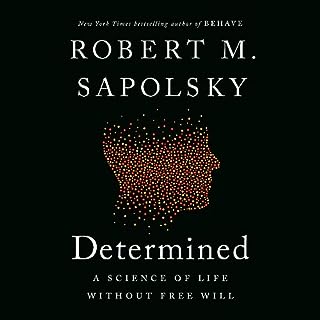
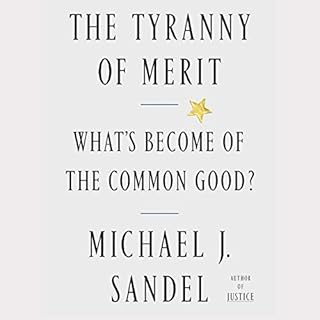

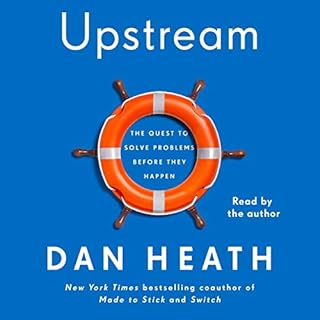


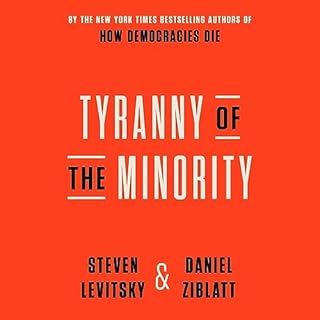
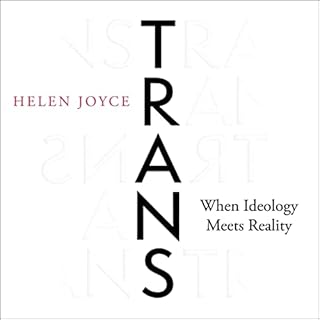

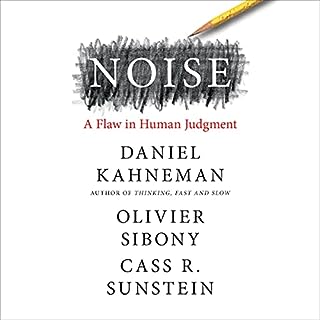

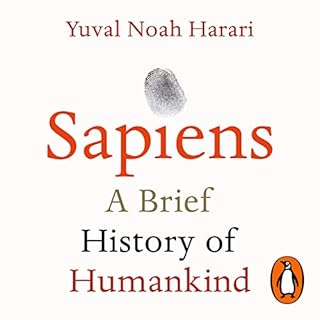
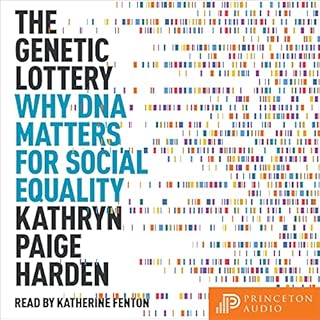


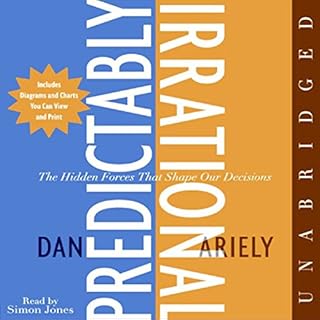
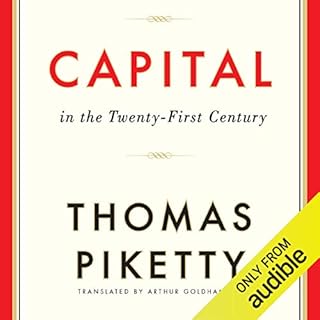












![El descontento democrático [Democracy's Discontent] Audiolibro Por Michael J. Sandel, Albino Santos Mosquera - transla](http://222.178.203.72:19005/whst/63/=lzldchZ-ZlZynmzbnl//images/I/511CQKQ40lL._SL320_.jpg)

